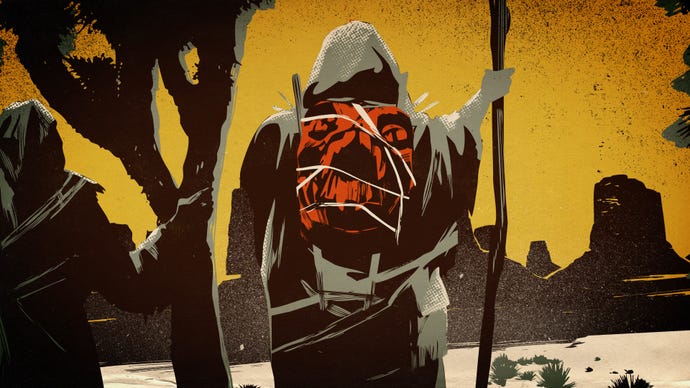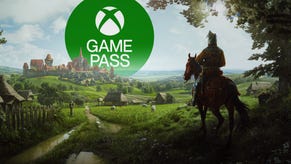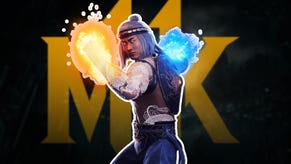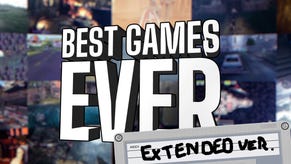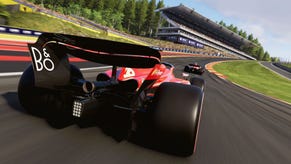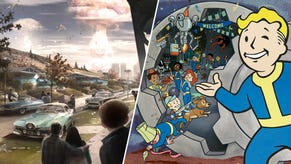"When a game is successful, it’s a miracle": Arkane founder Raphael Colantonio opens new studio and vows to fight industry trends
Raphael Colantonio is one of the few developers around today still fighting the good fight for the immersive sim.
His first job in games, at EA, was something he pursued because of his love of Ultima and games like it. He wanted to work his way up to develop deep and complex experiences for a maturing video game audience hungry for more meaningful interactions. Once he realised that EA's ethos was changing, he got out, eventually forming his own studio: Arkane.
Arkane has created some of the finest immersive sims around, from Dishonored to Prey, and even way back to Arx Fatalis, a cult classic dungeon crawler. Following the release of Prey, Colantonio left Arkane, leaving it in the hands of Harvey Smith, to spend more time with family, consult on games, and focus on his passion for music.
Now he's back in the game, launching a new studio called WolfEye as creative director and president, along with executive producer and CEO, Julien Roby. Their goal? To push back against industry trends where graphical power is king, instead focusing on interactions, physics, and AI. The studio's new game will be revealed during The Game Awards 2019.
We got chance to chat to Colantonio and speak about his vision for the studio, his past, cancelled games, industry trends, and why he hates ladders so much.
VG247: You started in game development by joining EA, right?
Raphael Colantonio: By who, sorry?
By joining Electronic Arts?
RC: Oh, yeah, yeah. That was a while ago. That was my first job, yes.
And you left because they started pursuing more mainstream stuff like sports games?
RC: Yes, I was a little frustrated, because between my desire to work on very PC hardcore things like - you know, when I joined them, they were big into Origin, Bullfrog, what else? Those really cool, hardcore companies, and then they started to shift their attention towards sports games and Sega Master System back then, which was not my cup of tea.
Do you feel like you’ve gone full circle then? In your press release you talked about big companies being risk-averse still. Has anything changed there?
RC: [laughs] Yeah, you’re right. I think that they are naturally, right? We’re creatures of habit, we’re creatures of comfort, and this goes beyond our personal desire. It’s a fallback, right? Whenever we know we’re about to do something well, we’re always going to do that again, and become better at it, because it just works. That’s why we make houses. We try to go for the most direct, most lazy way to reach comfort. And it’s part of growth in a company. When you become bigger and bigger and bigger, then it’s this natural aversion for risk and for change and for novelty.
And is pushback on new ideas one of the reasons you wanted to start a new studio?
RC: You know, there was no specific pushback on my ideas. It was more like, for me, I have a very adventurous mind, and after having been in a company that started really tiny, and as a single person, right? As we age, we don’t realise we aged, actually. It takes one day at a time. Then you look back and go, ‘Whoa! What happened in the past 18 years?’ Because in my case, I’d been staying with Arkane for 18 years. The majority was actually really fun, it’s just that in my personality and my need for adventure, I need change. I needed to refine myself. It often sounds weird to people, because of the comfort and the habits that we like to have in our lives, but for me it’s actually part of my being.
It’s interesting, because I was looking back on older interviews with you, and one of the things you said in one of them was that when you were making Prey and Death of the Outsider at the same time - you had Lyon on Death of the Outsider and Austin on Prey - you were like, ‘I don’t think we’ll push it any further than this. I think two games is enough.’ And now you’ve got Arkane doing Deathloop, they were helping with MachineGames’ Wolfenstein, and then they’ve got whatever they’re working on in Austin as well. So it’s still multiplying, that workload, and you would’ve been part of that going on. I guess you’ve just got to scale back at some point, or you keep rolling with it, don’t you?
RC: Yeah, I think there’s a natural - and again, there’s none of this that is truly always planned, right? You grow for a reason, if it’s immediate, and then you have these people, and now you have a new need, which is like, ‘What do we do with them?’ You don’t want to lay people off. You try to be useful to the rest of your organisation. In the context of having been part of a bigger group then it makes sense to help other teams, etcetera. Is it super fun? Probably not for me, but it makes sense, you know?
There isn’t a big problem with any of that, it’s just that, as I’m saying, sometimes you find yourself in the context that you posed. And all for logical reasons, there’s nothing wrong about that. And then you just realise, ‘Hey, you know what? I’ve been in this marriage for too long.’ And in my case, talking years of this really cool adventure, and every step was fascinating, being really big in different countries, making multiple games at the same time, working with some of my favourite people like Harvey [Smith]. So yeah, at some point it was time for me to press the reset switch. Some people are like that.
Between now and you leaving Arkane, you said that you wanted to take some time, and you were consulting with various game companies in that time. What was it that made you want to start Wolfeye? Did you get an idea for a game and you started the studio based on that? Or did you start the studio, decide that you’re going to make something, and build the game idea out from there?
RC: I think Julien [Roby] and I had a strong desire to work together again. If Julien was here, he would probably give some background about his story, but he too was part of Arkane. He was actually one of my very, very early employees. When he was 18, he joined a job at Arkane. And I think I literally needed a big break, and I think consulting for a variety of companies was great for me. Even though it was really low key, it was not working very much. There was this desire filtering out, and also it’s often, I don’t know if it’s true for every creative person, but it is for me - whenever I’m bored, that’s when I finally have a chance to - not even trying, some ideas come up. And then it’s a curse, right, because you can never rest.
I know it’s not quite the same, but I get my best article ideas when I’m lying in bed, trying to go to sleep, and then I’ll just be like, ‘Ah s**t.’ I need to grab my phone and make a note.
RC: It’s exactly the same. For me, it’s the same in music. If I try to compose something, there’s a very thin chance I’ll make anything interesting. It just takes you when you don’t expect it, which goes kind of against the industrial mindset of putting creativity in a bottle and in a process and in a controlled environment, where you have to deliver over and over, right? Pretty exhausting as well. And that’s interesting, because I don’t think anyone wants to solve this problem. I think there’s also a part of me wanting to reboot, reset. Because, it’s funny, I’m depleted of ideas or even the desire to do anything, right? Give me two weeks at the beach and I’ll be so bored, I’ll have some ideas. [laughs]
Why Wolfeye? Why the name Wolfeye? Where does that come from?
RC: I think we like the animal, it’s both a pack animal, and also an animal that acts on its own. There’s something that is efficient about the wolf. And the eye because he moves, he sees, that’s the wolf.
I know you can’t talk specifically about the game, but you said you want to try some new ideas with the studio announcement. Can you touch on some of the things that you want to try and explore, in terms of new ideas?
RC: Well, I would like to stay vague on this specific question, because it’s not time to do the announcement. But it’s related to the thing you noted about risk aversion. I think in general, I had a lot of fun with triple-A. I’ve had it in my dreams for maybe decades to - maybe not decades, but a big part of my life - do a big triple-A game and have that out of my system, and so we did it. We did Dishonored, Prey. And I’ve noticed one thing, that the more the world evolves that way, towards triple-A, what it really means is more graphic power. That’s what it means.
Because all of the extra CPU power, all of the better everything power, actually goes somehow in the graphics. I’ve noticed a funny thing between Dishonored 1 and Dishonored 2 - we had these conversations where... well, actually, no, that was between, sorry, Dishonored 1 and Prey. It was one generation. I remember this conversation with the lead programmer. ‘So how many characters can I have on screen in a fight?’ ‘Uh, maybe five or six.’ That was for Dishonored. That was kind of disappointing, but okay, we’re going to deal with it. So you get a character, and you have about, whatever, six, eight thousand polygons on the character, or more, I can’t remember.
And then you find yourself three or four years later, and same meeting, same conversation, ‘How many characters can I have, now that we have this new hardware?’ ‘I don’t know, five or six.’ And like, ‘what’s the point?’ So okay, now, they’re all like double the polygons, and they have more joints, more everything, so it can be more realistic. But basically, I’m just spending way, way more money. Now it takes more time, now every single decision has to have momentum. If I ask for a character, instead of taking three months of work, it will take six months of work. So there’s no leeway on the table to change that character, because otherwise I’m screwed. And making games, a lot of it is about changing your mind and going back and coming back on some decisions. Would you manage it if you had to write an article in one go and never go back to anything? Or if you do, it’s like the end of the world. Everybody’s complaining, it costs so much money to change one letter. You know, it’s the same. It’s a pain.
And it took three or four years to make as well.
RC: Yeah. So that trend of going crazy on graphics removes flexibility, it removes the part that is so important about creating new ideas, coming up with new concepts, etcetera, etcetera. And what I’ve noticed, as a gamer, not even as a developer, was that we’ve been playing the same games for the past two generations now. Three generations of hardware. The same games that I play now, I think I played them three generations ago. Actually, I did play them three generations ago. I don’t want to name any franchises, it’s not me to be that guy. I’m sure you can find a few. But it’s the same game, just prettier, meaning harder to make, more pain probably for everybody, it costs more money and I don’t know if it sold more. You probably sell much more because the market is growing.
As a game designer, it makes it very [difficult] to try new, interesting games. The difference between art direction and graphics, it has nothing to do [with it], actually. Graphics is just technology, it’s a support to the execution of the art direction, but you can have beautiful, beautiful games that actually leave memories and their intentions are always true, and then some games have super, super high graphics that have not very interesting art direction. So for me it’s about interesting worlds, interesting storytelling, great art direction. All of that, the graphics are secondary to that. And it’s true, you can also think of a lot of games like this in the history of video games, where people will remember some games because they had something in the colours, or something in the world definition that was interesting.
Like Zelda: Wind Waker?
RC: Yeah, yeah, all the Zelda games, for example. It’s a great example. They are all stylized, and their developers learned a long time ago that it’s not necessarily about spending a million dollars on voiceover and in the super, super high polycount characters with 60 passes on top of them, that makes a game, right? And Nintendo, in a weird way, has always been like that. Other platforms were trying to fight for the craziest graphics technology. Nintendo was just like, ‘Oh, we’re behind but it’s okay, we still have a lot of people interested in what we’re doing.’ Because everybody knows that they’re doing some great games.
Anyway, it’s a long answer, but it’s something I wanted to mention. I’m kind of going away from triple-A in the big graphics sense. We will make a big game. That’s our plans: to make big games with less budget. So they’re definitely going to have more of an independent feel, but I have to believe, I think it’s a trend. I don’t think we’re the only ones in that situation. I think the world in general, some of it still goes after the crazy graphics. It’s like Hollywood, right? They’re all going after the explosions. But more and more going towards more interesting and deep content, because that’s really what matters, that’s really what leaves a memory at the end of the day. It’s not the best explosion, no one thinks about that.
One of the things that frustrates me is that publishers and triple-A developers tend to go for really nice-looking screenshots, while AI and physics have stagnated to the point where stuff I was playing ten years ago has as complex physics as the games I play today, if not in some cases, better physics.
RC: Yeah, that’s true. Physics are also an element of disruption from a gameplay standpoint. Physics are unpredictable, they cost a lot still, because the more polygons you have, the more simulation you need to do. The more items you have in the room, if you physically simulate all of them, then it’s worse. It’s a bigger problem than it was ten, 15 years ago. And that’s a great example of why I want to go with games that are not so costly in terms of assets, because they in turn will actually push these kinds of things.
Do you still prefer more tailored experiences, or do you think you’ll touch on procedural generation which a lot of indie, immersive sims have done?
RC: Yeah, I think it’s part of the evolution of the practices in development in game design in general. It’s fascinating, some sort of AI, in fact, to the creation of your content, and lead to something that is more per player, per experience, rather than something that has been pre-authored. Yeah, it’s super fascinating. I’ve seen examples of that that was actually really encouraging, because you see on the one hand, often procedural means just random and out of context, which after a while is not very fun. But there are things that actually show really, really big promises, like the first time with some nemesis system in Shadow of Mordor. That was super, super satisfying, right? It’s a credit for procedural generation done well.
When I think of procedural content, I’m thinking of procedurally generated maps, and that doesn’t seem to gel well with your ethos of environmental storytelling.
RC: Yeah, it’s definitely a challenge. Doesn’t mean it can’t be tackled, doesn’t mean that we should not try. I think you have a team who tried to make those generated maps, and they addressed something that actually has meaning from the paintings or in the corridors. And it’s going to happen. I think the designers and developers out there are interested in this. It seems like a really natural condition of where we are right now, because it just costs too much to do, to handcraft everything. And also, we lose opportunity by handcrafting everything.
In the press release, you mentioned wanting to go deeper on player interactions. Could you give me any examples there?
RC: I’d probably rather stay away from it for embargo reasons, and the way we structure our announcements. Because if I give you an example, it’s probably going to somehow going to be related to what we’re doing.
That’s fine.
RC: Let me tell you something that I’ve already been into, you know. Again, I think it goes back to triple-A versus games that are more free. If you push triple-A to its limits, it’s going to be less interactive and more impressive, and so it goes against what I’m trying to achieve.
Back when Arx Fatalis released, it was a cult classic, but it didn’t do very well commercially. The same has happened with a bunch of immersive sims, in the triple-A space at least. Do you know what’s going on there?
RC: Well, first of all, I would say it’s true for any genre. Even if you take the most popular genres, not one percent of those games sold well. When a game is successful, it’s just, every time it’s a miracle. It’s just a hard thing. And in the specific case of the immersive sims, there haven’t been that many in the history of games, right? That’s super interesting if you think about it. How many have there been, 20? If you start with Ultima Underworld, which was probably the first one, I might be wrong, maybe Dungeon Master was, I can’t remember. I guess which one’s the true first one for me. System Shock, BioShock, Dishonored, Deus Ex obviously. Maybe S.T.A.L.K.E.R, maybe some Obsidian games, Vampire: Bloodlines.
So anyway, maybe you have, if you’re lucky, maybe there’s 20? So on 20, if there’s three or four that were successful, it’s a pretty good ratio. I think the reason why there are not many that were successful is that there are not that many that have been made in the first place. They are hard, hard games to make. They are very hard to explain to people, to market, because they are by nature a hybrid, so a mix of action and roleplaying and simulation, etcetera. They are a total pain in the neck to do. And that’s probably one of the reasons why there aren’t that many.
Did any other developers other than Julien come with you from Arkane Studios, to your new studio?
RC: We have a few that had left Arkane even before I did, and because Julien was very, very well liked at Arkane, like I was, so they were interested.
When you look back at the games that you released and games that you didn’t release, and you see The Crossing, how do you feel about that now? The cancellation of The Crossing? Because it feels like it was ahead of its time.
RC: Yeah. I think it’s a classic, you know. I think many, many times in history and in general there’s a good idea that comes out and unfortunately doesn’t make it for some reason, and back in the day it was extremely, extremely painful. Like a breakup. It was super, super painful. And then you look back ten, 12 years later, it was like a breakup with my ex, I just can’t even feel anything about it. But back in the day, it was extremely painful. It was one of my most painful experiences when I had to eventually give up and move on from it.
Yeah, it’s weird, because it feels like now a lot of immersive sims are trying to experiment with multiplayer modes and stuff like that. So if it had been done now, maybe it would have got greenlit, who knows?
RC: Yeah. For sure. I mean, there’s always going to be some video games that are going to not be made, not just the independent pictures and the scary pictures. But it is for me, in retrospect, that what we wanted to do is now pretty common. Back then, I was meeting publishers, and they were looking at me like an alien. Like how are we going to solve the matchmaking problems? Or some things that are not a problem now, it’s not even a question now if you make a game.
Yeah, it’s interesting. It was a little too early, and to me, it was one that we had chosen, but another one which we were very, very interested in, it’s just that they did not know what to do with it. And one of them was actually into it more than the others, to the point that we had a contract with them, but the deal was so awful and horrible in setting us up to fail, that eventually that’s when we started to work on the game called LMNO with EA.
Last thing, do you still hate ladders?
RC: Huh. Uh, yeah. [laughs]
So no ladders in your new game then? I’ve got the scoop!
RC: You know, I think there might be ladders in the new one, too! [laughs] No, I’m joking, I don’t know if there’s ladders. You know, ladders are a problem if you think about it, because when an AI is on a ladder, you can’t use the ladder. If you’re on the ladder, the AI can’t use it. How do you pull out your things while you’re on the ladder? Now you’re in an animation or you fall from the ladder. How do you get on the ladder, how do you get off the ladder?
I quite liked the quote I heard when I watched you speak about ladders before: ‘How many ladders have you climbed in real life?’ Like you don’t go up and down ladders all the time, do you?
RC: That’s true, I think the last ladder - actually, no, I did. I did climb a ladder maybe because I had to change one of my - you know in America we have those super annoying beeping fire alarm systems that we don’t have in France. So I don’t know if you have that in the UK, but anyway, and for some reason it’s like super, super high on my ceiling, and I had to use a ladder. That’s it, that’s for me the only ladder I’ve used in the past two or three years.
Well, at least you know how to implement a ladder in a game, if you have a little sidequest about turning an alarm off.
RC: You know, exactly. Now there’s a reason, we’ve figured it out.
That’s great, thank you.
